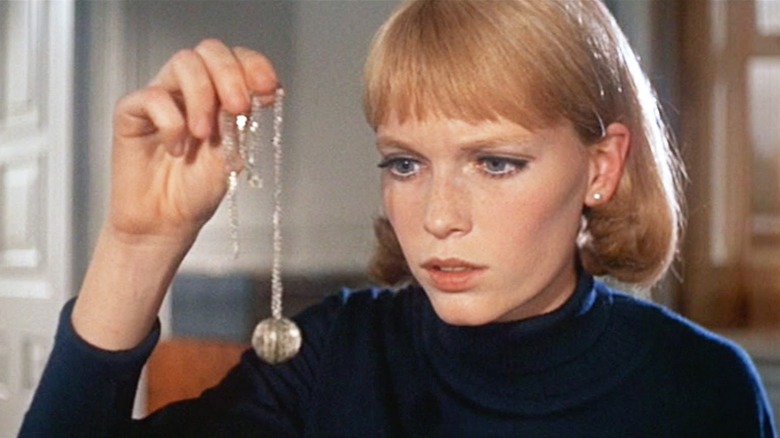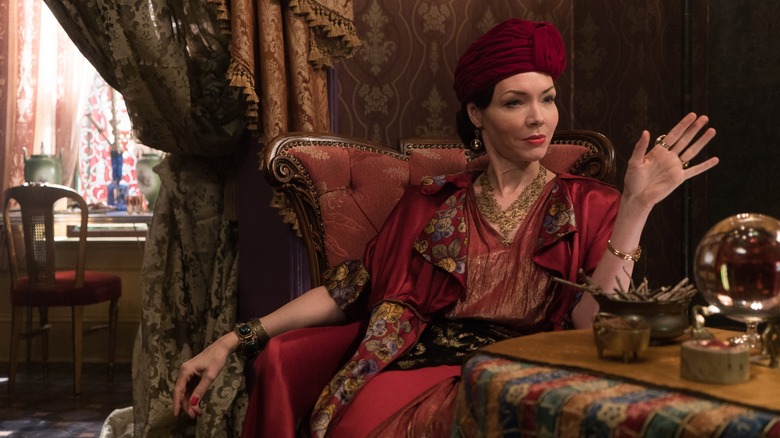The Weird Connection Between The Marvelous Mrs. Maisel And Rosemary's Baby
What does a period comedy-drama about a housewife turned stand-up comic have in common with a psychological horror about a housewife groomed by a Satanic cult? That's the riddle at the center of a minuscule but fascinating link between the hit Amazon Prime series "The Marvelous Mrs. Maisel" and "Rosemary's Baby." Sure, both use the deceptive bliss of domestic life as ground-zero for some unorthodox shakeups. Not to mention both heroines have the misfortune of being saddled with boys for husbands, though we will grant Joel Maisel's arc is not without some serious growth and redemption (Guy Woodhouse, on the other hand, remains a top-grade douchebag). But there's also a big difference in tone that the story of Miriam "Midge" Maisel summons in contrast to Rosemary Woodhouse's yearning for a child, as evidenced in the lopsided ratio of laughs to grimaces that either has.
So what exactly connects these seemingly atypical worlds?
Tannis Root and Rose
Of the many colorful characters that fill the ranks of "The Marvelous Mrs. Maisel," very few come close to Midge's own mother, Rose Weissman. And fans know one of her most devoted idiosyncrasies is her compulsive need to consult psychics on the topic of her daughter — particularly over fears that the carefully conceived trajectory of her life won't stay the course. One such attempt sees Rose taking a charm filled with tannis root and placing it clandestinely under Midge's pillow in the season 1 episode "Ya Shivu v Bolshom Dome Na Kholme."
The only problem is tannis root doesn't exist — it's was invented by novelist Ira Levin for "Rosemary's Baby." In both the book and director Roman Polanksi's film adaptation, tannis root appears as a sort of foreboding warning to Rosemary, informing her of the extensive conspiracy of witches that surrounds her and her baby. But for Midge, it ends up being the stinking cherry-on-top of a disastrous dinner with Joel, her parents, and in-laws. Even after she discovers it under her pillow, the night gets somehow even worse — Joel's father Moishe reveals that the couple is essentially broke and because of their split, he's taking away their apartment (which he owns). In minutes, what was supposed to be a moment of "triumph" foretold by Rose's psychic becomes a catastrophe that leaves the Weissmans reeling. So while Midge isn't carrying the child of Satan and facing passive-aggressive witches at every turn, I'd like to think the comic in her would still appreciate the bitter irony of the tannis root foreshadowing her less fantastical but no less bleak situation.
Mrs. Weissman's Psychic Patterns
Something similar happens in the season 2 finale, "All Alone." The Weissmans are determined to not make the same mistake with Benjamin as they did with Joel. Abe gives the groom-to-be an arduous application process, while Rose heads to her psychic. But when the psychic nonchalantly envisions Midge giving a speech in front of a large crowd, she desperately gleans it as proof her daughter will be married. She leaves before the psychic can relay the pretty crucial detail that she saw Midge wearing a black cocktail dress – not exactly wedding attire. This is a clue made all the more important when, later in the episode, Rose tirelessly reminds her daughter that champagne is the dress color of choice for second weddings — not white.
As with the tannis root, Rose finds herself believing that everything will be okay in the end. And yet, unbeknownst to her, an immense amount of dramatic irony is being stockpiled at her expense. It doesn't get much worse than realizing that, instead of having a wedding, your daughter is going on tour for six months. Even Abe joins in by dropping the bombshell of departure from Bell Labs and Columbia University. Just like at the disastrous dinner, when it rains, it pours. Thankfully there are plenty of laughs to keep you afloat during the deluge.


